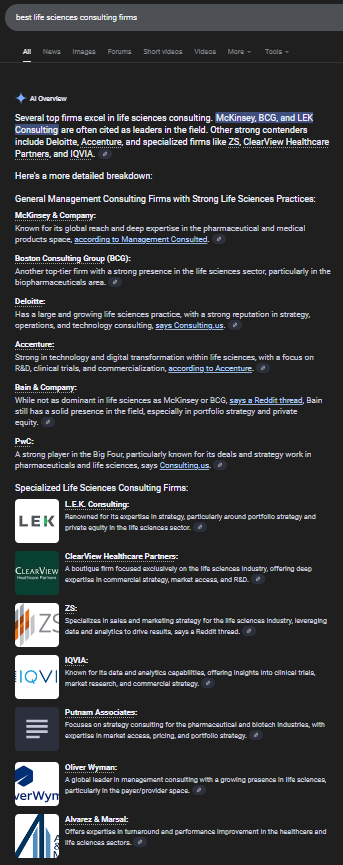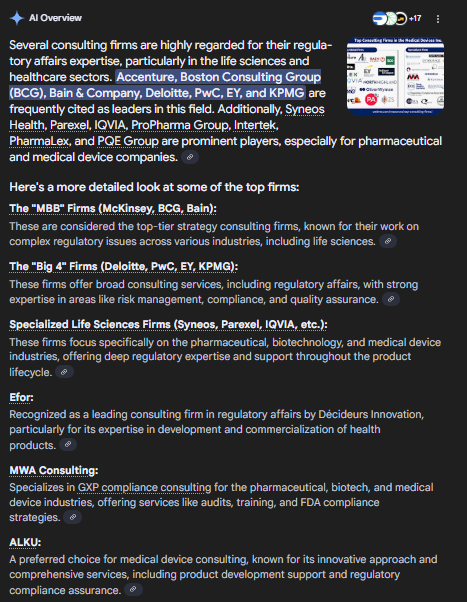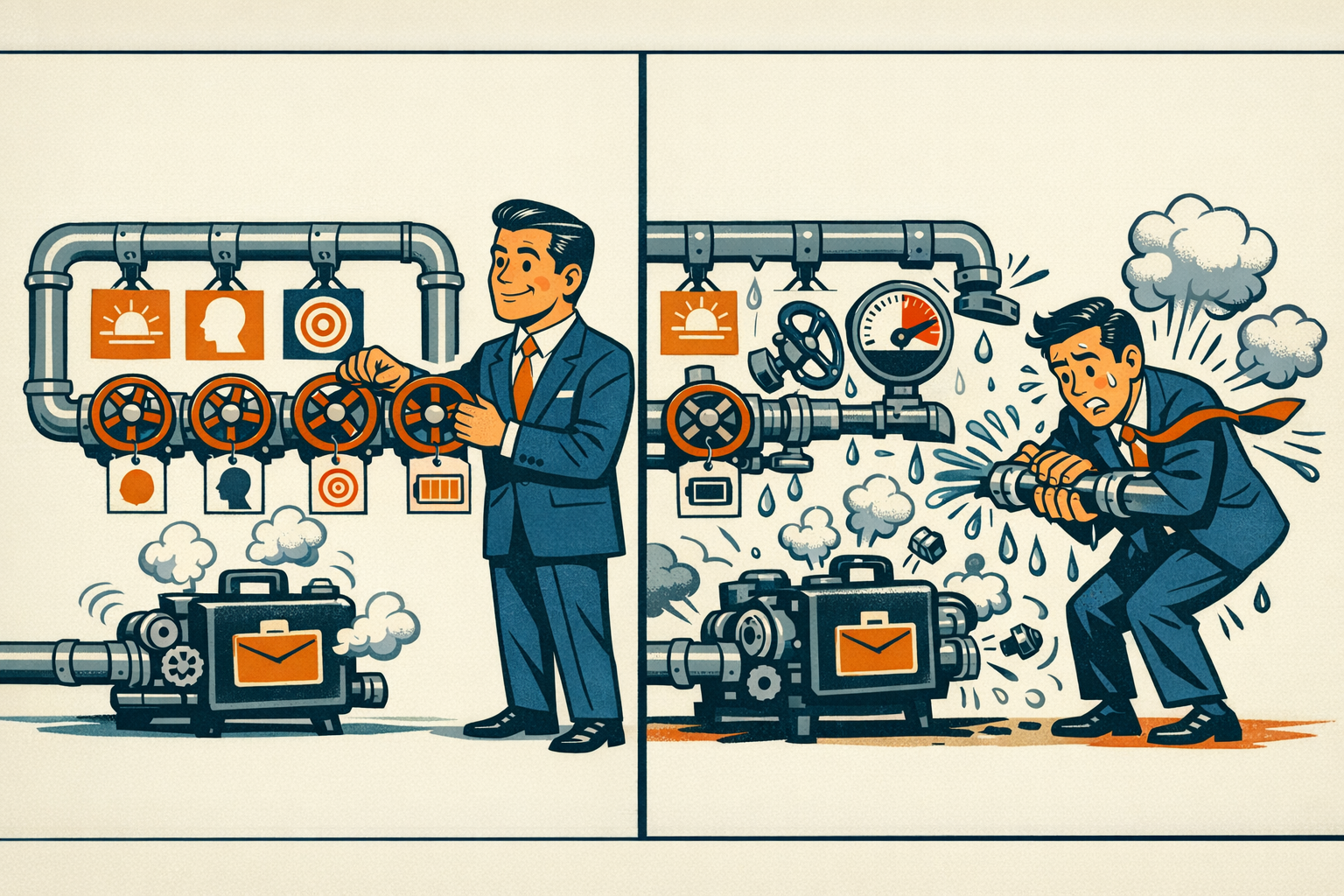"Do you do SEO services? Specifically, can you do the on-page stuff and the writing?"
That was the first question from a prospective client when I was just starting out as a marketing consultant almost 15 years ago.
"Yes, I can do both" I responded.
"Great, we have been paying someone $50/hour for that and it hasn't been working out, so we are looking at different options." He said.
Obviously my sales skills needed a lot of work back then, but that isn't what I want to talk about today. Yes, my first response to that first question should have been something like "I have a fairly broad set of capabilities from my agency experience, but I am especially good a solving a particular type of problem. Do you mind if I ask you some questions about your business and the challenges you are facing before we get into capabilities and solutions?" But again, that's not the point. The point is that by reflexively jumping into the capabilities trap, I branded myself as one of many interchangeable solutions.
The point I want to get across to you today, is that clients don't buy capabilities - even if they start the conversation by asking for them, like my former prospective client - they buy confidence in outcomes.
Why Clients Obsess Over Capabilities
It's hard for consultants and consulting firm founders to grasp this because clients by default ask about and search for capabilities. They do it for two reasons:
- The believe they know what capability will solve their problem - oftentimes they are wrong.
- It's a reaction to bad positioning - when they don't know what it is that you do, they start asking about specific capabilities so that they can place you in some sort of category.
Let me show you how this plays out, from personal experience of prospective clients I have spoken to over the years.
More often than not, clients come to me because they believe they have an awareness or lead generation problem (e.g. "we aren't getting enough leads to fill our pipeline" or "not enough people know about us"). They see this as a marketing problem, and they look for a "marketing consultant" who has capabilities like branding, content marketing, lead generation, etc. However, in most cases they haven't actually articulated the real problem, and virtually always they don't understand the root cause.
In most cases, by the time a prospective client comes to me, their firm has seen stalled growth over multiple years, and they have tried to fix it through tactical marketing applications (e.g. content marketing, LinkedIn thought leadership, advertising, SEO, etc.) In most cases, the real problem is that they aren't hitting the growth and profitability targets that will get them to the exit they (or their investors) want, but they believe that the solution is improving awareness and increasing leads. Maybe not completely wrong, but definitely incomplete.
So while I can help them address awareness and lead generation through content marketing and thought leadership, if I jump into that capabilities trap, I will never be able to solve their real problem, because they will cordon me off in what they believe is the "marketing corner". What I really help them with is create alignment between their personal needs and the business needs, and then reposition the business in a way that de-risks the buying decision for their ideal clients so they can hit their growth and profitability targets and eventually have a successful exit.
Capability Positioning = Commodity Positioning
Oh and by-the-way, if I jump into the capabilities trap, I am also putting myself into a situation where I will feel immense downward price pressure because of the commoditized nature of general marketing services.
There are thousands of fractional marketing consultants out there. I label myself as a Growth Consultant by-the-way, because most people think of marketing as just promotion, while I focus on the full 4Ps, and focus on the broader business strategy first, and marketing second. So it is important to identify the category you want to play in - I generally don't recommend that consulting firms focus on the category design playbook, because that's often a trap as well - but I don't advise communicating and promoting your positioning in terms of the category. Categories in professional services are still fairly commoditized.
Positioning yourself as a "______ consulting firm" reduces you to a line-item vendor interchangeable with dozens if not hundreds of others.
Consider a life sciences consulting firm that focuses on being able to offer clinical operations consulting, medical affairs consulting, and regulatory affairs consulting. All you need to do is do a quick search to find dozens, if not hundreds of firms that will look identical and interchangeable.


This shows us a couple of things if you aren't in this "best/top" list, it's unlikely that you will be recommended by peers or considered by prospective clients. This makes your boutique firm a risky bet. It also means that if you play this game, you will be forced down the lowest price spiral. When all you offer is capabilities, competing on price is inevitable because why would I hire a relatively unknown boutique firm for the same price I can hire a known brand? So you are forced to position yourself as "Big 4 service without the Big 4 price" which is not a good place to be.
Think about the last time you walked through the cereal isle at the grocery store... do you remember the last time you considered buying the TasteeOs instead of the Cheerios?
Never? Then why do you think anyone wants the discount/offbrand version of the Big 4?
If you find yourself having to say things like this, it's a major flag that there is something wrong with your positioning. This doesn't mean that you can't/shouldn't use price to undercut competitors or the Big 4, but you shouldn't have to position yourself based on that - it isn't the differentiator you want to be considered based on. Even if you never say this externally, but you talk like this internally, you are introducing a discount mindset into your organization, which will inevitably have ripple effects on all functions - opereations, delivery, finance, marketing, sales, etc.
What Truly Differentiates You
Hint, it's not your people or your process.
Your prospective clients may not be able to identify the root cause of their problem, and they may not know the appropriate solution, but they definitely know the outcomes they are looking for. They know what their "there there" looks like. Your job as a consultant is to tease that out of them, and help them think differently about their problem and the potential solutions. This is outcome-driven storytelling where you lead with the transformation, not the solution, and definitely not the features (aka capabilities).
This narrative needs to be anchored in real intellectual property - proprietary methodology, frameworks, and assets that help your ideal clients reframe their problem, better understand the solution space, and confidently make a selection to execute and scale. This isn't some fluffy clever trademarked acronym that at the root is just the same best practices that every other consulting firm touts. It's real research-based (qualitative, quantitative, empyrical, etc.) ways of thinking, understanding, and doing.
And last, but not least, this needs to align your personal mission with the client's biggest strategic goal - their desired outcomes. This is especially important for indie consultants and founders of micro-firms, but it's also important to consider in larger firms as you bring on senior partners and how you develop your recruiting and hiring strategy.
A Simple (not easy) 5-Step Repositioning Framework
- Identify and agree upon the ICP (ideal client profile).
- Extract, synthesize, and package up the necessary IP (intellectual property) into frameworks, methodologies, and assets that help ideal clients understand and reframe their core problem. Articulate the end-state. Own a point of view.
- Reconfigure the service offering and delivery model to deliver on the value promised by the IP.
- Map the industry ecosystem, and identify the appropriate centers of influence to evangelize the IP. Clearly show exactly how each capability fuels that end-state.
- Enable the business development team to effectively have conversations about and sell the IP and related services.
Is Your Firm Positioned for Growth?
Your positioining needs to de-risk the buying decision for your ideal clients, because with more choice in the market (AI, fractional CXOs, offshore resources, etc.) the risk of choosing the wrong partner has increased exponentially. That risk has increased both for the individuals making the decisions, and for the organizations they work for.
Take the Positioning Risk Assessment to uncover hidden issues making your firm a risky choice for your ideal clients.
If you want to stop competing on price, start owning the story. I can help.



.png)


